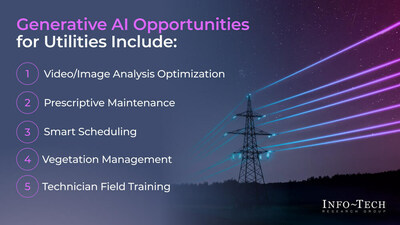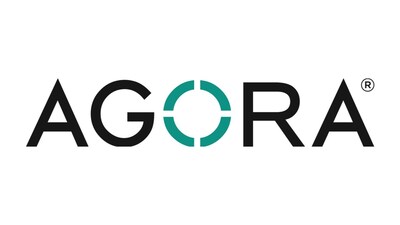Generative AI Represents a New Era for the Utilities Industry, Says Info-Tech Research Group in New Resource
Press Releases
Oct 17, 2023
New research from the global IT research and advisory firm aims to bridge the gap between recent technological advancements, such as artificial intelligence, and their implementation in the utilities industry. The firm's findings spotlight specific use cases for operational optimization and innovation.
TORONTO, Oct. 17, 2023 /PRNewswire/ – Despite significant investments in Gen AI technologies, the implementation of AI within the utilities industry has been slow due to a void in understanding how to align AI strategies with business objectives and establish effective IT-business governance models. In a bid to bridge the gap between generative AI advancements and their adoption in the utilities industry, Info-Tech Research Group has published a comprehensive new resource titled Generative AI Use Case Library for the Utilities Industry. The resource was developed to assist utility sector leaders in overcoming the hurdles of Gen AI adoption by providing a range of value-driven Gen AI use cases tailored specifically for the utility sector.
"AI is not new for utilities. In fact, data scientists or engineers in the line of business have been using machine learning (ML) models to assist in system planning for years," says Jing Wu, Principal Research Director at Info-Tech Research Group. "One of the unfortunate realities is that they spend weeks and months wrangling data before they can get to the mathematical modeling and AI part of the problem solving. Developing strong fundamental data fabrics can accelerate the deployment of AI use cases at scale."
In the firm's resource for utilities, Info-Tech explains that leaders in the industry often have a limited understanding of potential AI use cases and how to initiate them to support strategic objectives. There is an industry-wide concern about the risks associated with AI, particularly in relation to compliance with privacy laws, regulations, and policies. Additionally, utility organizations can face challenges with the quality and accessibility of the massive amount of data being generated. The uncertainty surrounding how to effectively address these issues underscores the need for more defined strategies for the successful deployment of AI.
"Utilities are cautiously optimistic about the potential of AI technologies while assessing their limitations and risks," explains Wu. "When it comes to emerging technologies, most utilities have always been followers. It is less likely utilities will jump on the bandwagon of implementing quick and cool demos. Unless the disruptions are imminent and the ROIs are clear, utilities will stay patient and reap the benefits of others' proven use cases and adapt from others' lessons learned."
In the resource, Info-Tech advocates for strategic and responsible integration of AI within the utilities sector, emphasizing the need for a comprehensive understanding of use cases and benefits and a well-structured approach to tackling implementation challenges. The resource also highlights AI's remarkable potential to revolutionize various aspects of the utilities sector. The potential is outlined below:
Video/Image Analysis Optimization: Use AI-enabled systems to process a vast number of videos and images to detect potential defects and create corresponding plans required to mitigate risks.
Prescriptive Maintenance: Leverage AI-powered asset management tools to generate recommendations for asset maintenance plans based on analysis of asset risk profiles.
Smart Scheduling: Optimize real-time resource planning and scheduling through the use of Gen AI tools.
Vegetation Management: Use Gen AI tools to generate prioritized tree-trimming work schedules for high-risk areas.
Technician Field Training: Develop Gen AI interactive virtual environments to continuously train utility field technicians.
While generative AI continues to evolve and redefine possibilities, the firm warns utility leaders not to overlook the potential of existing AI capabilities. Even though AI technologies may not grab headlines like their Gen AI counterparts, they have demonstrated consistent success across a variety of industries worldwide. For example, robotic process automation (RPA) stands out due to its technological maturity, proven return on investment, and ease of integration.
For a comprehensive understanding of Gen AI's role in the utilities industry and to gain actionable strategies for successful AI adoption, download the complete Generative AI Use Case Library for the Utilities Industry.
For media inquiries on the topic or to get exclusive, timely commentary from Jing Wu, an expert in the utilities industry, please contact Senior PR Manager Sufyan Al-Hassan at [email protected].
Info-Tech Research Group is one of the world's leading information technology research and advisory firms, proudly serving over 30,000 IT professionals. The company produces unbiased and highly relevant research to help CIOs and IT leaders make strategic, timely, and well-informed decisions. For 25 years, Info-Tech has partnered closely with IT teams to provide them with everything they need, from actionable tools to analyst guidance, ensuring they deliver measurable results for their organizations.
Media professionals can register for unrestricted access to research across IT, HR, and software and over 200 IT and industry analysts through the firm's Media Insiders program. To gain access, contact [email protected].
For information about Info-Tech Research Group or to access the latest research, visit infotech.com and connect via LinkedIn and X.
![]() View original content to download multimedia:https://www.prnewswire.com/news-releases/generative-ai-represents-a-new-era-for-the-utilities-industry-says-info-tech-research-group-in-new-resource-301959659.html
View original content to download multimedia:https://www.prnewswire.com/news-releases/generative-ai-represents-a-new-era-for-the-utilities-industry-says-info-tech-research-group-in-new-resource-301959659.html
SOURCE Info-Tech Research Group




